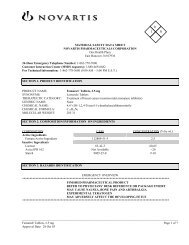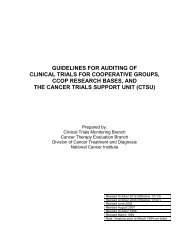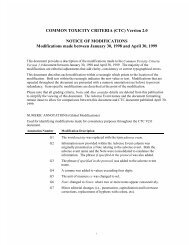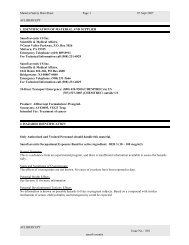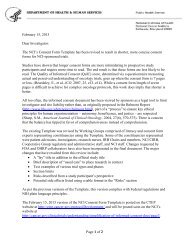NCI National Clinical Trials Network (NCTN) Program Guidelines
NCI National Clinical Trials Network (NCTN) Program Guidelines
NCI National Clinical Trials Network (NCTN) Program Guidelines
You also want an ePaper? Increase the reach of your titles
YUMPU automatically turns print PDFs into web optimized ePapers that Google loves.
PART 1: Overview of <strong>NCTN</strong> <strong>Program</strong> Section I – Description of Essential Features & Key Components<br />
focus has allowed the Group <strong>Program</strong> to complement, rather than duplicate, research supported by the private<br />
sector.<br />
Cancer medicine has evolved in recent years into a more molecularly-based discipline. Diagnosis is being<br />
improved through genetic sub-classification as well as functional imaging of tumors and new treatments are<br />
being developed aimed at specific cancer-related pathways. As part of its effort to take advantage of new<br />
discoveries in oncologic science, <strong>NCI</strong> asked the Institute of Medicine (IOM) in 2009 to review the <strong>NCI</strong>-sponsored<br />
<strong>Clinical</strong> <strong>Trials</strong> Cooperative Group <strong>Program</strong>. The IOM report (http://iom.edu/Reports/2010/A-<strong>National</strong>-Cancer-<br />
<strong>Clinical</strong>-<strong>Trials</strong>-System-for-the-21st-Century-Reinvigorating-the-<strong>NCI</strong>-Cooperative.aspx) noted that, despite its<br />
impressive record of accomplishment, the current trials system has become less efficient, has difficulty<br />
prioritizing studies, and has been underfunded for the number of trials that it conducts. The IOM report<br />
recommended that the existing adult <strong>Clinical</strong> <strong>Trials</strong> Cooperative Groups be consolidated into a smaller number<br />
of Groups, each with greater capabilities and appropriate incentives to promote better overall system<br />
integration. Consolidation should promote efficiency by encouraging a structural makeover of clinical trial group<br />
operations centers and statistics and data management centers. It should also facilitate prioritization in clinical<br />
research by focusing trials even more than before on questions unlikely to be addressed by the private sector.<br />
Based on the IOM review recommendations as well as additional input received by the <strong>NCI</strong> from stakeholders<br />
across the oncology community, the <strong>NCI</strong> has developed a comprehensive plan to transform the previous <strong>NCI</strong>sponsored<br />
<strong>Clinical</strong> <strong>Trials</strong> Cooperative Group <strong>Program</strong> that funded several separate organizations conducting<br />
cancer treatment trials into a new consolidated and integrated <strong>Program</strong> referred to as the <strong>NCI</strong> <strong>National</strong> <strong>Clinical</strong><br />
<strong>Trials</strong> <strong>Network</strong> (<strong>NCTN</strong>).<br />
C. Overall Goal of the <strong>NCTN</strong> <strong>Program</strong><br />
The overall goal of the <strong>NCTN</strong> <strong>Program</strong> is to conduct definitive, randomized, late phase clinical treatment trials<br />
and advanced imaging trials across a broad range of diseases and diverse patient populations, as well as<br />
development efforts preliminary to those trials, as part of the <strong>NCI</strong>’s overall clinical research program for adults<br />
and children with cancer.<br />
In order to achieve the overall goal of the <strong>Program</strong>, essential features of the <strong>NCTN</strong> will include:<br />
� A coordinated, collaborative, and inclusive process, i.e., involving broad representation from the<br />
oncology community including academic and community clinical investigators, translational science<br />
investigators, statisticians, and patient advocates for generating concepts, primarily for late phase,<br />
definitive, clinical trials to evaluate innovative cancer treatments in specific cancers and/or with a focus<br />
on specific modalities (e.g., imaging, radiation, surgery);<br />
� Prioritization of trial concepts for development and conduct by national <strong>NCI</strong>-managed disease and<br />
modality-specific steering committees composed of leading cancer experts and advocates from the<br />
extramural community, including <strong>Network</strong> Group representatives, as well as <strong>NCI</strong>, consistent with<br />
national priorities for clinical cancer research;<br />
� Efficient and timely activation, conduct, and completion of clinical trials meeting all regulatory<br />
requirements, through the effective integration of scientific expertise and clinical trials management<br />
capabilities; and<br />
� Incorporation of innovative science into clinical trials through collaboration among institutions and<br />
investigators with expertise in various medical specialties/disciplines relevant to treatment of adult and<br />
childhood cancers (e.g., pharmacology, clinical oncology, imaging) as well as those with expertise to<br />
integrate translational science into design and conduct of <strong>NCTN</strong> trials.<br />
D. Anticipated Organization of Key Components of the <strong>NCTN</strong> <strong>Program</strong><br />
In the <strong>NCTN</strong> <strong>Program</strong>, a <strong>Network</strong> Group is defined as a clinical trials group with a dedicated Operations Center<br />
and an associated Statistics and Data Management Center responsible for the design and development of<br />
Page 15 of 241




